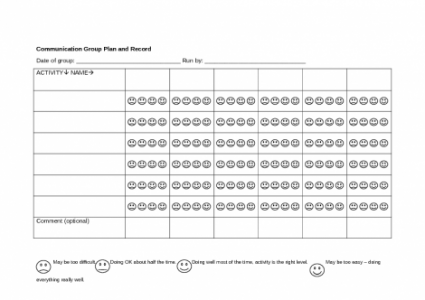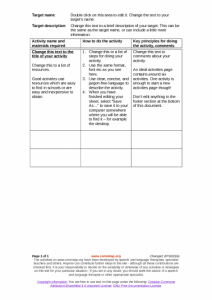Search
User login
Topic “Early Years (0-5yrs)”
Early Years (0 to 5 years)
Developing attention and listening skills through motivating activities
| Activity/strategy name and materials required | How to do the activity | Key principles for doing the activity and comments |
|---|---|---|
| Sensory Play - Sensory toys and materials for messy play (e.g. trays with sand/ cornflour and water/jelly). - The best toys are those that the child can manipulate easily to produce a result. | 1. Guide your child's hands and visual attention to toys/trays of material(s) that they can touch and look at. 2. Let your child explore the toys/materials in the tray and encourage them to investigate all their properties, stimulating all of the child's senses as far as possible (colour, smell, texture). 3. You may need to draw the child's attention back to the activity if the child becomes distracted. Use your voice to regain their attention (e.g. a drawn out "ohhhh!", or an intake of breath). | Do not continue with something the child has lost interest in, but wait a while before introducing another object. |
| Turn taking games - Ball / dark cloth - Your voice - to sing simple nursery rhymes that have an element of anticipation built in such as "Round and round the haystack, like a little mouse, one step, two step and into his little house". | This is a fun activity for you and the child to enjoy together. Use plenty of facial expression and your voice to gain and keep the child's attention. |
Today arrow
Picture:

Picture description:
Arrow to indicate today on a timetable.
Common irregular past tense verbs
Created 15 May 2012; updated 6 December 2021.
Common irregular past tense verbs
These can be used with activities sheets from www.commtap.org including:
- make phrases in past tense using irregular verbs 1
- make phrases in past tense using irregular verbs 2
Some common irregular past tense verbs for use in the above activities
See below if you are not sure what an irregular past tense verb is.
Symbols - overview and sources
Symbols, communication symbols or picture symbols, are a powerful and systematic support for communication.
Description
Communication symbols are sets of images which represent words and concepts in a language in a consistent way. They are designed for use with people having difficulties accessing text and for those with communication difficulties.
They can be used with:
Games and activities to help develop social skills
Created 2 May 2012; updated 23 March 2022.
Games and activities to help develop social skills
It can be difficult for some children to identify and understand social cues. To help develop the social growth of these children, there are lots of fun ways to help improve their social skills.
Prepositions
Prepositions are words which show the relationship between a noun (e.g. "cat") or a pronoun (e.g. "she") and other words in the sentence. For example, "My cat is on the table", "I went with Mike to the cinema". Prepositions can indicate relationships in time and position as well as other types of relationships. Information about prepositions (about.com).
Smiley face group progress sheet
Quick therapy/lesson evaluation sheet - using a rating scale of four smiley faces.
The idea is for the child/person to evaluate themselves in terms of how well they were able to do the activity. This helps the person running the activity to select harder or easier activities as time progresses - keeping them at a level where there is generally a high degree of success.
Created 16 February 2012; updated 16 July 2015.
Activities to develop understanding of a negative and a noun, e.g. "no hat"
| Activity/strategy name and materials required | How to do the activity | Key principles for doing the activity and comments |
|---|---|---|
| Dressing up - Some everyday clothes eg hat, gloves, scarf, sun glasses - Large soft toy - Digital camera or phone with a camera. |
| |
| - |
Key Word Signing
Key word signing is used with people with communication and/or learning difficulties. Key word signing is always done whilst speaking, and you use it to sign the most important words that you are saying at an appropriate level for the person you are signing with.
Activities Sheet Template
This is a Word template which can be used to make an activities sheet in the standard format used on the Commtap site.
Created 7 October 2011; updated 16 July 2015.
Support Commtap to keep it online
Thank you for visiting Commtap.
Please read this message as it is extremely important.
- Visitor donations mean we can continue to host over 1,000 free activities to support speech, language, and communication development.
- Visitor donations mean we can continue to provide free resources to address a wide range of communication needs, including limited speech or language, interaction challenges, and needs associated with conditions such as developmental language disorder, autism, and cerebral palsy.
- Visitor donations mean we can continue to provide resources to support the work of speech and language therapists, teachers, teaching assistants, parents, and carers.
- Visitor donations mean we can continue to provide the free key word sign dictionary (bks.org.uk) which has over 2,000 Makaton and Signalong signs.
We know that not everyone is able to afford to pay to access these resources, however, if you can, please make a donation to keep the site going.
Thank you
Google ads on this page are provided by Google Adsense - and their presence does not imply any endorsement by Commtap. Report a problem with an ad on this page. Log in (for free) to avoid seeing Google ads.







